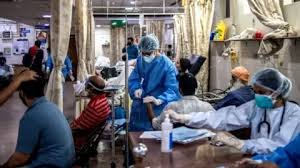New Delhi- The Government of India has undertaken extensive measures to make healthcare accessible, affordable, and of assured quality for every citizen, both in rural and urban areas. Through the National Health Mission, the country is working towards universal access to equitable services, with special focus on strengthening health systems, addressing reproductive, maternal, neonatal, child and adolescent health needs, and tackling both communicable and non-communicable diseases. Under this initiative, existing sub-health centres and primary health centres have been upgraded into Ayushman Arogya Mandirs offering a complete range of twelve free service packages that are preventive, promotive, curative, palliative, and rehabilitative, bringing healthcare closer to communities. By June 30, 2025, the country had operationalised 1,77,906 such centres across rural and urban India. Union Minister of State for Health and Family Welfare, Shri Prataprao Jadhav, stated this in a written reply in the Lok Sabha today.
The Pradhan Mantri Ayushman Bharat Health Infrastructure Mission, with an outlay of Rs64,180 crore for 2021 to 2026, is focused on building capacities to strengthen healthcare systems at all levels and to ensure preparedness for present and future pandemics or disasters. This includes the creation and strengthening of Ayushman Arogya Mandirs, Block Public Health Units, Integrated Public Health Labs, and Critical Care Blocks across states and union territories.
The Ayushman Bharat Pradhan Mantri Jan Arogya Yojana remains a flagship scheme, offering Rs5 lakh annual health coverage for secondary and tertiary care hospitalisation to 12 crore vulnerable families. In October 2024, the coverage was extended to 6 crore senior citizens aged 70 years and above through the Vay Vandana Card, regardless of their socio-economic background, ensuring that age does not become a barrier to quality healthcare.
Digital transformation is also being prioritised through the Ayushman Bharat Digital Mission, launched in 2021, which aims to create a nationwide digital health infrastructure. It provides every citizen with an electronic health record, supported by the Ayushman Bharat Health Account, a health professional registry, and a health facility registry, enabling continuity of care across all levels.
The Pradhan Mantri Swasthya Suraksha Yojana addresses regional disparities in tertiary care while enhancing medical education facilities. It includes the establishment of 22 new AIIMS and the upgradation of 75 government medical colleges across the country. Over the past decade, medical education capacity has expanded significantly, with the number of medical colleges rising from 387 in 2014 to 780 in 2025, undergraduate seats increasing from 51,348 to 1,15,900, and postgraduate seats from 31,185 to 74,306.
These measures reflect the government’s commitment to building a stronger, more inclusive healthcare system capable of serving the needs of every citizen and meeting the challenges of the future with resilience and efficiency.



